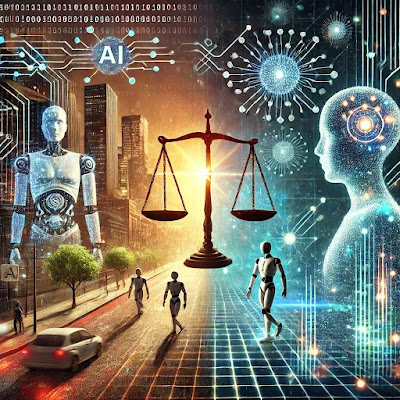AI Evolution and Its Ethical Dilemmas
Artificial Intelligence (AI) is one of the most transformative technologies in our era, changing industries and redefining possibilities. From self-driving cars to generative AI systems that produce hyper-realistic content, AI is advancing at an unprecedented pace. While these innovations promise immense benefits, they also bring ethical dilemmas that require urgent attention.
The Rapid Evolution of AI
From a mere theoretical concept, AI has come of age, especially with the recent leaps in machine learning, neural networks, and natural language processing, which have resulted in a behemoth like ChatGPT, DALL·E, and recommendation systems. All these technologies are revolutionizing the health sector, financial world, and education through automation of jobs, prediction of outcomes, and increase in productivity.
The most eye-catching development is that of generative AI. Such tools create text, images, music, and even deepfake videos, and one can no longer tell the line between human and machine creativity. Generative AI content is not something unusual anymore but a mainstream tool businesses and people use widely. But with an increasingly autonomous AI that begins to make decisions on its own, ethical challenges come up.
The Ethical Dilemmas of AI
1. Bias and Discrimination
AI systems learn from data, often filled with biases. Released, these biases will lead to unfair treatment in extremely sensitive domains, such as hiring, police decisions, or credit evaluation. A hiring algorithm, trained on historical data composed mainly of men, is likely to inadvertently disadvantage women applicants.
2. Misinformation and Manipulation
Generative AI can create convincing fakes, including images, videos, and news articles. Potential risks include misinformation, political manipulation, and erosion of trust in digital content.
For example, deepfakes have been used maliciously to spread propaganda or harm reputations.
3. Job Displacement
AI-driven automation is threatening the traditional job roles that have existed in the manufacturing sector, customer services, and even in the creative industry for centuries. Though it might create opportunities, it is at the cost of making unemployment and inequality worse in this transition period.
4. Privacy
AI-based systems use enormous data, which includes personal information and raises concerns about consent, surveillance, and data misuse at a time when the regulations governing privacy are still insufficient.
5. Autonomy and Accountability
There will be questions about who should be held accountable if the autonomous vehicle crashes, or if the recommendation by an AI tool causes harm.
The Future Roadmap: Responsible AI Development
Addressing these ethical challenges requires industries and stakeholders to act responsibly to ensure responsible AI development. Steps include
- Policy Transparency: Companies are clear about how an AI system operates and on what criteria the AI system based its decisions.
- Bias Removal: Regular audit and diversely trained dataset reduce bias from algorithms.
- Regulation and Governance: Governments are already in the process of developing policies, with one such example being Europe's proposal for an AI Act: to regulate highly risky applications of AI.
- Education and Upskilling: Education can act as an important enabler because a trained workforce can ease more smooth changes and greater inclusive transformation because of AI-driven change. While its promises to enrich lives and businesses are without a doubt exciting, so are its dilemmas concerning ethics.
The need for responsible innovation in cooperation with other global efforts will assure that development in AI improves the whole of society. As it grows and continues to improve, it is necessary to remain up to date and concerned about such developments in shaping the future in ways that align technology and ethics.



.jpg)

0 Comments